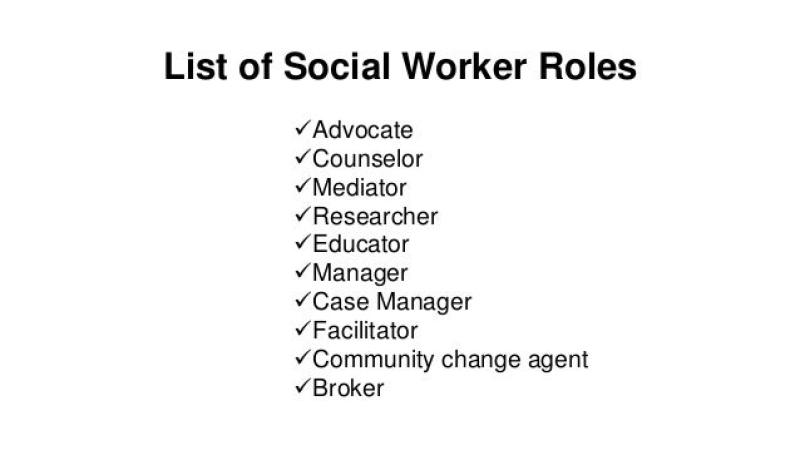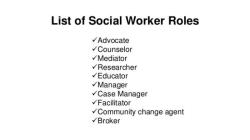What are the roles and responsibilities for a social worker?
Social workers play a crucial role in helping individuals and communities address various challenges and improve their well-being. The roles and responsibilities of a social worker can vary depending on their specialization and the setting in which they work. Here are some common roles and responsibilities associated with social work:
Assessment:
- Conduct comprehensive assessments of clients' needs, strengths, and challenges.
- Gather information about clients' social, economic, health, and psychological conditions.
Counseling and Support:
- Provide counseling and emotional support to individuals, families, and groups.
- Help clients cope with and navigate personal and social challenges.
Advocacy:
- Advocate for the rights and interests of clients within various systems (legal, educational, healthcare, etc.).
- Promote social justice and work towards eliminating discrimination and inequality.
Case Management:
- Develop and implement case plans to address clients' needs and achieve specific goals.
- Coordinate services and resources to support clients in meeting their objectives.
Crisis Intervention:
- Respond to crises and emergencies, providing immediate support and intervention.
- Collaborate with other professionals and agencies in crisis situations.
Community Development:
- Work to enhance the well-being of communities through the development of social programs and services.
- Facilitate community engagement and empowerment initiatives.
Education and Prevention:
- Educate individuals and communities on social issues, resources, and available services.
- Develop and implement prevention programs to address social problems.
Research and Evaluation:
- Conduct research to better understand social issues and contribute to evidence-based practices.
- Evaluate the effectiveness of social programs and interventions.
Policy Development:
- Participate in the development and analysis of social policies.
- Advocate for policies that promote social justice and address systemic issues.
Documentation and Record-Keeping:
- Maintain accurate and confidential records of client interactions and interventions.
- Complete necessary paperwork, reports, and documentation.
Supervision and Training:
- Provide supervision and guidance to less experienced social workers or social work students.
- Stay updated on new developments in the field and participate in ongoing training.
Ethical Practice:
- Adhere to ethical standards and principles in all aspects of social work practice.
- Navigate complex ethical dilemmas and maintain professional boundaries.
These roles and responsibilities highlight the diverse and multifaceted nature of social work. Social workers often work in collaboration with other professionals, agencies, and community members to create positive change and support individuals and communities in need.
Social workers are professionals who assist individuals, families, and communities in achieving their full potential and improving their quality of life. They work in a variety of settings, including hospitals, schools, mental health clinics, and government agencies.
Roles and Responsibilities of Social Workers
Social workers perform a wide range of duties, but some of their most common responsibilities include:
Assessment and evaluation: Social workers assess the needs of their clients and develop plans to address those needs. They may also conduct evaluations to measure the effectiveness of their interventions.
Counseling and therapy: Social workers provide counseling and therapy to individuals, families, and groups. They help their clients to cope with mental health problems, relationship problems, and other challenges.
Case management: Social workers manage cases for their clients, which involves coordinating care, making referrals to other services, and advocating for their clients' needs.
Advocacy: Social workers advocate for the rights and interests of their clients. They may work to change policies and programs that have a negative impact on their clients.
Community development: Social workers work to improve the well-being of communities by developing and implementing programs and services that address community needs.
Duties and Obligations of Social Workers
Social workers have a number of duties and obligations, including:
Maintaining confidentiality: Social workers must keep all client information confidential.
Avoiding conflicts of interest: Social workers must avoid conflicts of interest, such as providing services to clients with whom they have a personal relationship.
Complying with ethical standards: Social workers must comply with the ethical standards of their profession.
Staying up-to-date on professional developments: Social workers must stay up-to-date on the latest research and developments in their field.
Job Expectations for Social Workers
The specific job expectations for social workers vary depending on their setting and specialty. However, some of the common job expectations for social workers include:
Having a strong understanding of human behavior and social issues.
Being able to communicate effectively with clients.
Being able to work independently and as part of a team.
Being able to handle difficult situations with composure.
Being committed to social justice and ethical practice.
Social workers play a vital role in society by helping individuals, families, and communities to overcome challenges and improve their well-being. They are highly skilled professionals who are dedicated to making a positive difference in the world.










